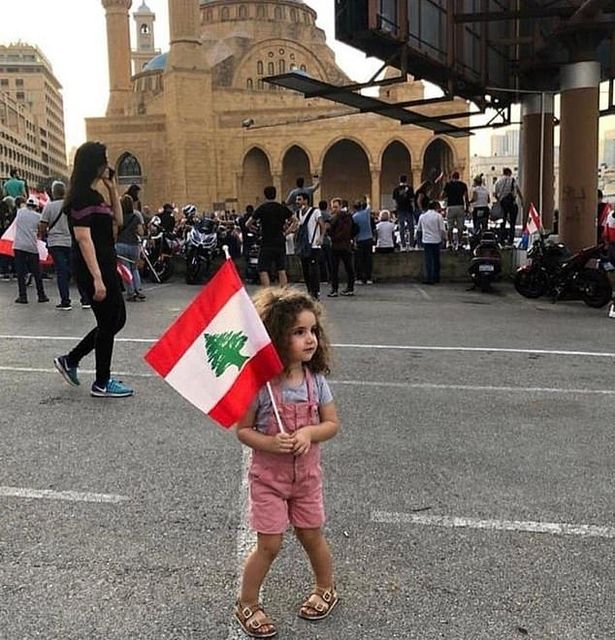Web-based photo of Alexandra Naggear -- the youngest victim of the Port explosion -- in one of the Beirut Demonstrations.
Some Lebanese funeral scenes are sadly surreal: the color of the coffins, the young age of the victims, the teen pall-bearers dressed in white, carrying the casket of their 15-year old friend — Elias Khoury — instead of celebrating his graduation or a sports achievement. Thousands nationwide have paid tribute to one of the youngest lost — a 3-year old victim whose coffin is shrouded in the Lebanese flag. This same three-year-old, Alexandra Naggear, or Alixou as her parents call her, became a permanent fixture in the 2019 October Uprising, when she was photographed on her father’s shoulders holding the same Lebanese flag in downtown Beirut. Alexandra suffered a fatal injury following the Port explosion, in her home where her parents thought she would be safe.
The endless funerals since August 4th, many of which were televised and shared on social media, have struck a chord among the Lebanese people. Furthermore, ominous signs now accompany the psychological shock and sadness that has engulfed the country. The economic meltdown coupled with the Port explosion and its cataclysmic consequences is pushing Lebanon to its worst existential crisis: the hemorrhaging of citizens that will result from the expected surge in youth emigration.
Like so many people, the Lebanese are eager to keep their families together rather than have them join the centuries-old diaspora across the globe. Historically, economic and political hardships have driven them abroad. However, some returned home following success in academic or business endeavors, to raise their children and be close to their families. This old tradition is about to be broken. The older layers of family used to act as a form of deterrence that limited permanent emigration by encouraging the younger generations to return home. Lebanon’s recent political and economic problems have weakened this deterrent and reversed this tradition. Nothing illustrates this better than a recent tweet inspired by a saying from Lebanese folklore: "A mother used to tear up when her children emigrate, now she weeps when they stay in the country" — a message not lost on most of the populace.
Almost every family has at least one member who left decades and even centuries ago. Immigrants have been a lifeline for their families and the country, sustaining them against all odds, even and especially the direst of them — government corruption, mismanagement, and wars. They sent remittances to their families to support them in a country that lacks all forms of social infrastructure, especially health care and medical insurance for older adults. In interviews following his daughter's death, Paul Naggear stresses that he returned with his wife and child three years ago to establish a company and contribute to his country. His is just one example among many.
When some immigrants returned during the 1950s, 1960s, and even before the civil war, Lebanon provided them more than the warmth of their families. The country provided safety, some level of political stability, and a rich environment in which to raise families. But this has dwindled to almost nothing in recent years, culminating in the economic meltdown that began last fall. The economic and financial collapse did not spare even far away immigrants, who suffered from policies of capital controls and other measures that limited their access to lifelong savings, decisions that had immediate consequences for themselves and their families at home.
Many of Lebanon's emigration stories centered on the threat of starvation that drove many Lebanese away during the Great Famine in the early years of the last century. Ironically, today, similar risks, including the dangers of famine that may befall some portions of the Lebanese populace, are discouraging immigrants from returning home and persuading others to leave the country. The ruling political class, represented by the president, his son-in-law, and allies, has recklessly spent much-needed resources at home on scores of overseas trips and activities to encourage immigrants to return home, reclaim citizenship, vote in elections, and importantly, invest in Lebanon. The launching of this campaign was also ironic since, in calling upon immigrants to return, the political class has laid the foundations of a government based on the alliance between militia and mafia, thus depriving the country of the fundamentals of law, safety, and economic security.
The Lebanese will have to contend with an anticipated surge in emigration as soon as COVID-19 begins to recede, a development that will drain the country of its human capital. There are already reports of villages and towns being emptied of their young, leaving behind only the elderly who are perhaps physically unable to emigrate or lack the resources to travel this road. This trend is the greatest existential crisis that Lebanon has faced in many years.
This article appeared in Al Jadid Magazine, Vol. 24, No. 79, 2020.
Copyright © 2020 AL JADID MAGAZINE

